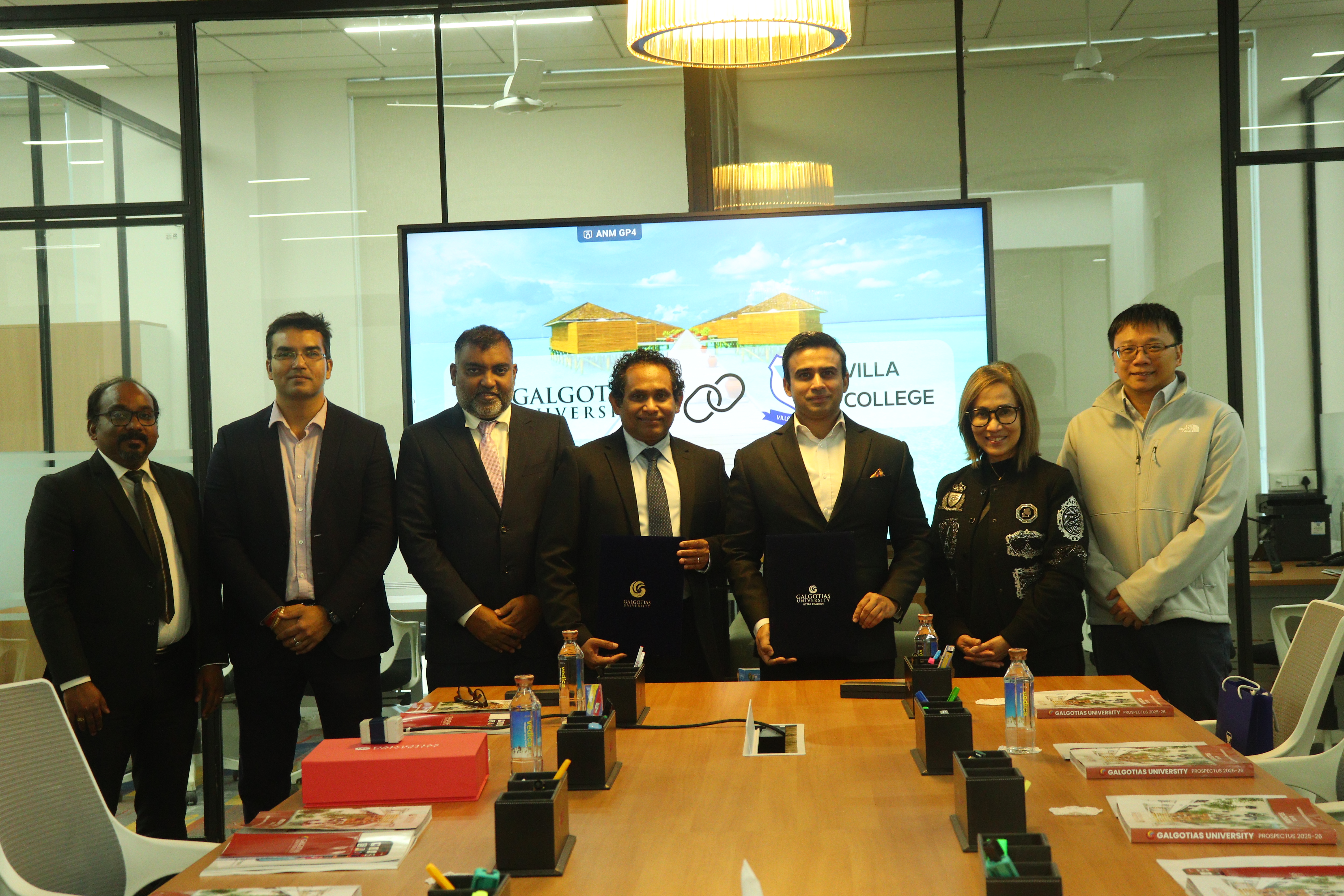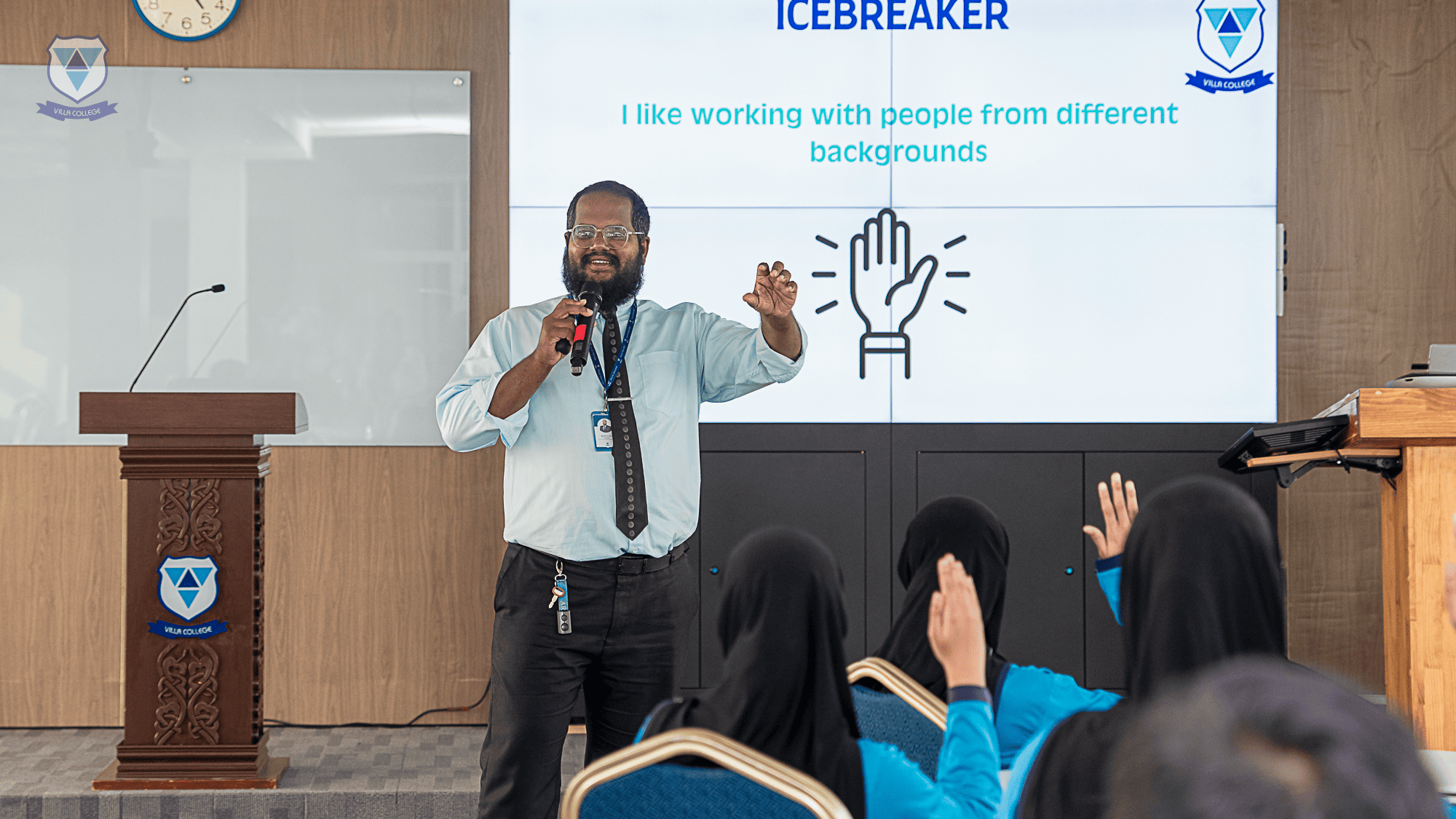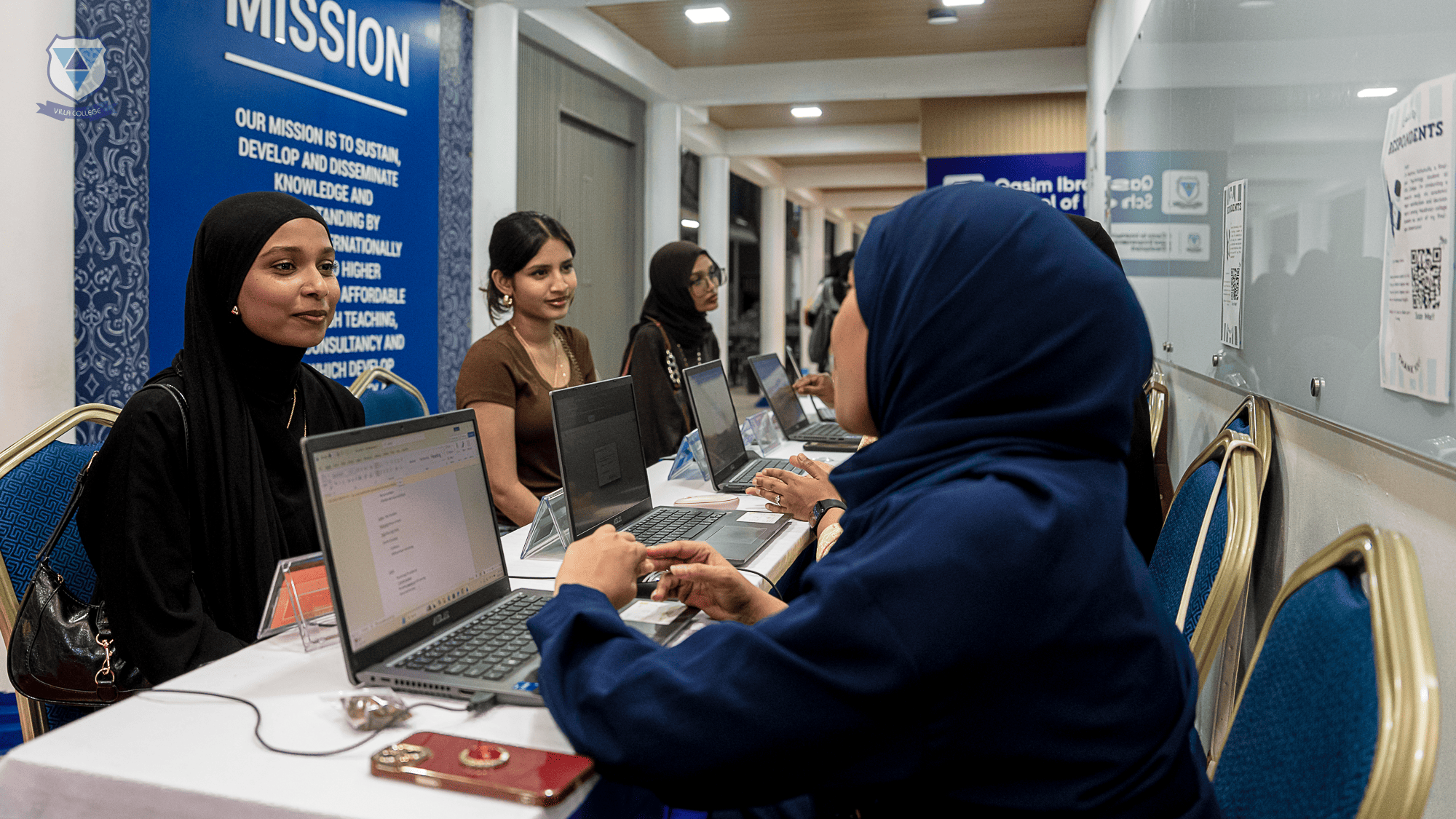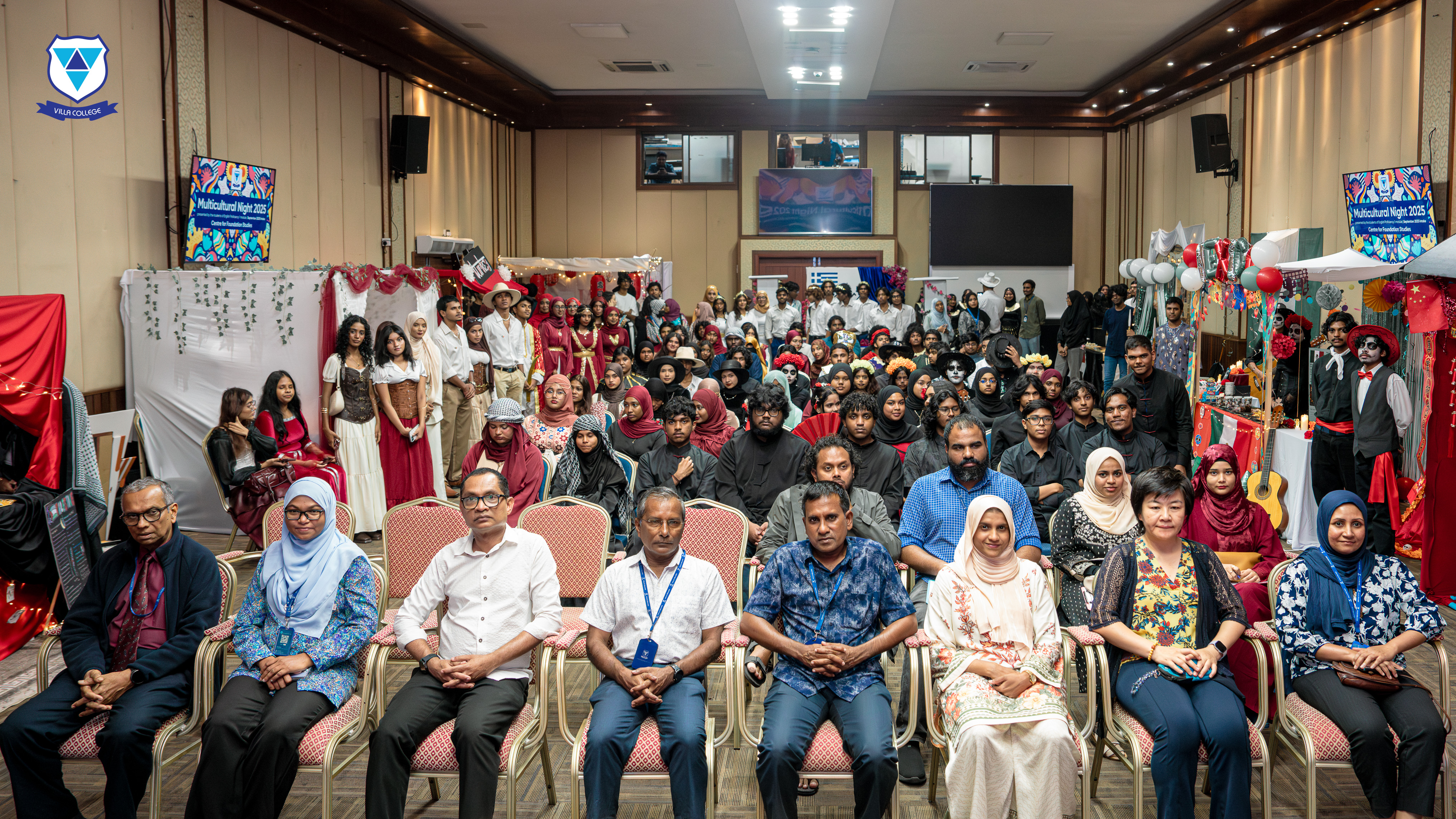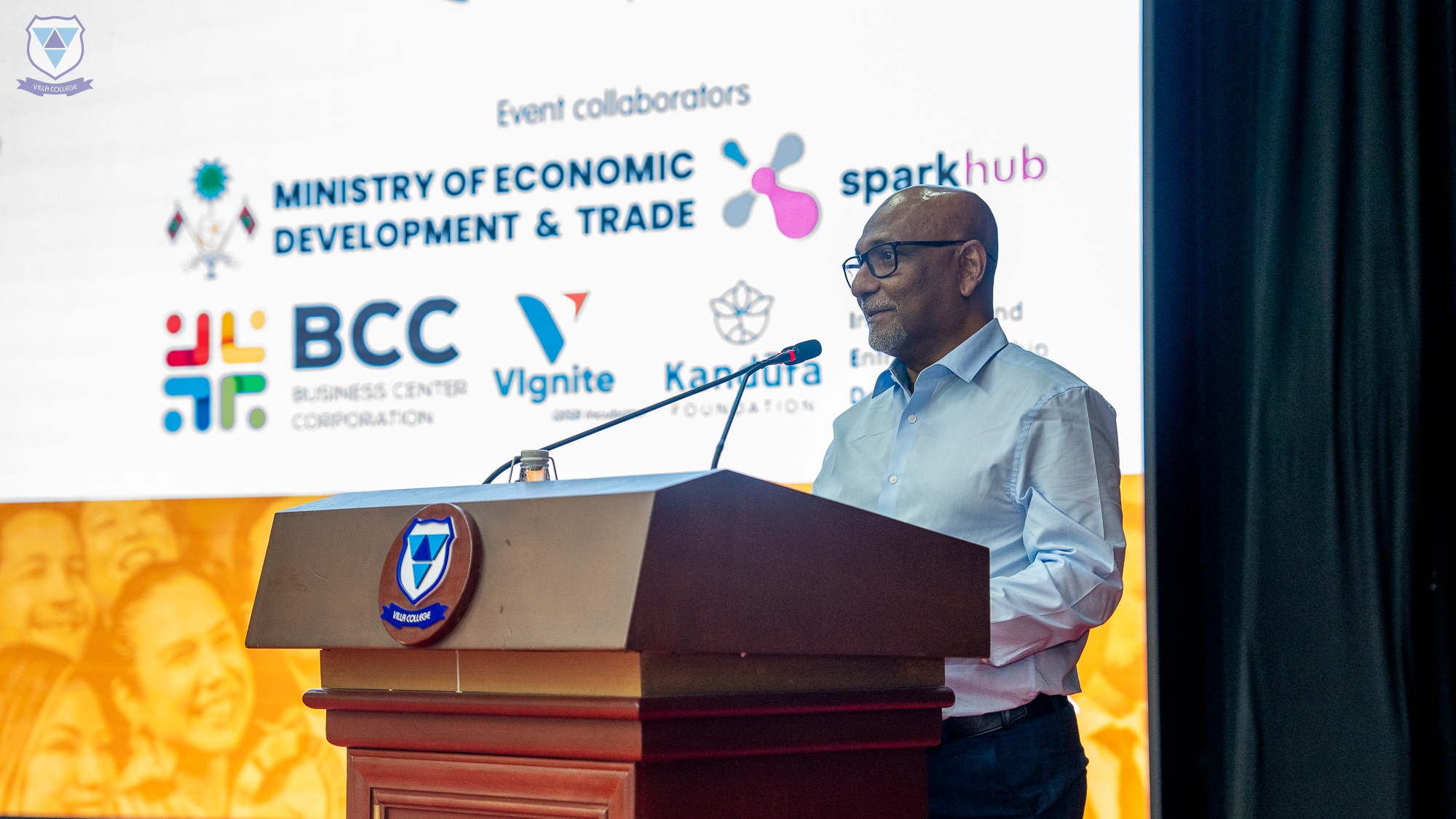The opening ceremony of Global Entrepreneurship Week Maldives 2025 marked a significant milestone in the nation's journey towards building a more inclusive and innovation-driven entrepreneurial ecosystem. Held on 18 November 2025 at ÃÜÌÒÊÓƵ's QI Campus, the event brought together a diverse community of academics, practitioners, students, and ecosystem partners under the unifying theme of "Together We Build." This theme served not merely as a tagline but as a call to action, emphasising the collective responsibility required to shape a resilient entrepreneurial future for the Maldives.
Opening remarks by Mr Abdulla Nafiz, Dean of the Qasim Ibrahim School of Business, underscored the critical importance of entrepreneurship education and the cultivation of an innovation culture. His words resonated with the audience as he highlighted how institutions must shoulder their collective responsibility in nurturing a sustainable entrepreneurial ecosystem.
The keynote address, delivered by Mr Mohamed Inaz, Director of Climate Change and Sustainable Development at Nexia Maldives, provided a compelling vision for the future. His presentation challenged attendees to consider the intersection of entrepreneurship and environmental stewardship, emphasising that climate-conscious entrepreneurship and sustainability-driven economic growth are not optional extras but fundamental requirements for the Maldives. He called upon young entrepreneurs to engage meaningfully with future-focused innovation, recognising that the challenges of tomorrow require solutions conceived today. Following this inspiring address, both Mr Abdulla Nafiz and Dr Damith Gangodawilage officially introduced GEW Maldives 2025 and the Research Conclave programme, providing a comprehensive outline of the week's national activities and explaining how they aligned with the global theme of "Together We Build."
The Research Conclave formed the intellectual centrepiece of the opening day, featuring five distinctive presentations that explored critical dimensions of entrepreneurship development. Mr Mohamed Shareef, Senior Advisor for Digital Transformation at Nexia Maldives, opened the academic proceedings with his presentation titled "Decolonising Entrepreneurship Education in the Maldives: A Framework for Sovereign Innovation." His work challenged conventional approaches to entrepreneurship education and proposed pathways towards developing contextually relevant frameworks that honour the Maldives' unique cultural and economic landscape whilst fostering genuine innovation capacity.
Dr Abdulrahman Abubakar of QISB at ÃÜÌÒÊÓƵ followed with an exploration of "Innovation Ecosystems: Sources, Structures and Strategic Management of Collaborative Value Creation." His presentation examined the complex networks and relationships that enable innovation to flourish, providing insights into how various stakeholders can work together strategically to create shared value. This theme of collaboration echoed throughout the day, reinforcing the central message of collective responsibility and partnership.
The third presentation shifted focus to practical business expansion strategies. Mr Mohamed Eeman Ahmed, Director of Investment and International Relations at the Business Centre Corporation, shared his insights on "Unlocking SME Potential: Strategic Approaches to Sustainable Expansion." His presentation addressed the challenges faced by small and medium enterprises in scaling their operations whilst maintaining sustainability, offering strategic frameworks that balance growth ambitions with long-term viability.
Mr Mu'awiyath Mohamed Didi, an independent researcher and disability rights advocate, delivered what proved to be one of the most thought-provoking presentations of the day. His work on "Beyond Welfare: Building Disability-Led Entrepreneurship in Small Island Developing States" challenged conventional narratives around disability and economic participation. By reframing the conversation from welfare dependency to entrepreneurial agency, his presentation opened new avenues for thinking about inclusive economic development in contexts like the Maldives where geographic and resource constraints require innovative solutions.
The final presentation of the Conclave was delivered by Dr Byju Madhavan of Qasim Ibrahim School of Business, who examined "The Impact of Perceived Barriers on Entrepreneurial Intention Among Students in the Maldives, with the Moderating Effect of Entrepreneurial Education." His research provided valuable empirical evidence on how educational interventions can help students overcome psychological and practical barriers to entrepreneurship, directly supporting the case for continued investment in entrepreneurship education programmes.
Key partner organisations included the Ministry of Economic Development and Trade, Business Centre Corporation, Kandufá, SparkHub, Vignite Foundation, and the event's main sponsor, Maldives Islamic Bank. The presence of such diverse stakeholders embodied the collaborative spirit that the event sought to celebrate and strengthen.
In recognition of their contributions to advancing knowledge and dialogue around entrepreneurship development, certificates were awarded to all researchers and panel members. This gesture acknowledged not only their individual expertise but also their willingness to share insights that could benefit the broader entrepreneurial community in the Maldives.
The closing session provided an opportunity to reflect on the significance of the day's research discussions and the importance of evidence-based approaches in strengthening entrepreneurship development. The closing remarks emphasised that building a sustainable entrepreneurial ecosystem requires ongoing collaboration among educational institutions, policymakers, industry bodies, and community organisations. No single entity can create the necessary conditions for entrepreneurial success alone; rather, it requires the kind of coordinated effort and shared commitment that the theme "Together We Build" encapsulates.
The formal proceedings concluded with a networking and mocktail session. This informal gathering allowed presenters, faculty, students, and partners to exchange ideas freely, explore potential collaborations, and begin building the relationships that might ultimately prove as valuable as the research insights shared earlier in the day. Such connections often serve as the foundation for future partnerships, research collaborations, and practical initiatives that translate academic insights into real-world impact.
The opening ceremony and Research Conclave successfully established a strong foundation for the remainder of GEW Maldives 2025. By combining inspirational keynote addresses with rigorous academic presentations and meaningful stakeholder engagement, the event demonstrated how research and practice can inform one another productively. It reinforced the national commitment to innovation, inclusivity, and entrepreneurial growth whilst providing concrete evidence and frameworks that can guide future action.
As the Maldives continues to navigate the complex challenges of building a diversified, resilient economy in an era of climate change and rapid technological transformation, events like GEW Maldives 2025 play a crucial role. They create spaces for dialogue, foster collaboration across sectors, and ensure that entrepreneurship development is grounded in both evidence and lived experience. The success of this opening event suggests that the Maldives is indeed ready to build its entrepreneurial future together, drawing on the collective wisdom, resources, and commitment of its diverse ecosystem of stakeholders.
